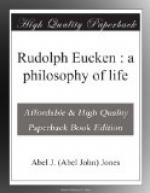So far, then, we have seen how Eucken proves the inadequacy of the realistic conceptions of life, and how they really depend for their acceptance upon the assumption of a Universal Spiritual Life. We have still to see how he attempts to prove that basing human life upon an eternal spiritual life satisfies the conditions he himself has laid down for a satisfactory solution of the problem. He has to show that the theory gives a satisfactory explanation of human life, that it gives a firm basis for life, that it releases man from being governed by low motives, and admits of the possibility of human personality, freedom, and creation. We shall see in the chapters that follow that he makes a convincing case for accepting the belief in the Universal Spiritual Life as the basis of human life and endeavour.
CHAPTER V
THE “HIGH” AND THE “LOW”
Eucken makes the recognition of the existence of a Universal Spiritual Life the starting-point of his constructive work. He takes up a position which he calls the noeological position. Many theories take up a materialistic position; they assert the reality of the material world, and endeavour to explain the world of matter as something independent of the human mind. Other theories assert the superiority of mind over matter, and endeavour to examine the mind as though it were independent of the material world. These two types of theories have been in continual conflict; the one has attempted to prove that thought is entirely conditioned by sense impressions received from the material world, the other regards the phenomena of nature as really nothing other than processes of the mind.
Eucken finds reality existing in the spiritual life, which while neither material nor merely mental, is superior to both, admits the existence (in a certain sense) of both, and does away with the opposition between the rival types of theories. Eucken does not minimise or ignore the existence of the natural world. The question for him is not the independent existence of the worlds of nature and mind—this he admits; he is concerned rather with the superiority of the spiritual life over the merely material and mental.
The natural life of man has been variously viewed in different ages. The writer of the Pentateuch described man as made in the image of God, and the natural man was exalted on this account. Some of the old Greek philosophers, too, found much in nature that was divine. Christianity took a different view of the matter—it exalted the spirit, and emphasised the baseness of the material. The growth of the sciences made man again a mere tool of laws and methods, but it considered matter as superior to mind, mind being entirely dependent upon impressions received from matter. The question continually recurs—which is the high, which is the low? Shall nature triumph over spirit, or spirit over nature?




